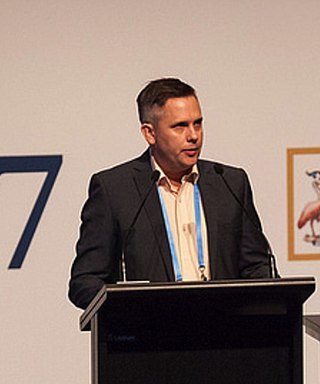Transfusion medicine is the branch of medicine that encompasses all aspects of the transfusion of blood and blood components including aspects related to hemovigilance. It includes issues of blood donation, immunohematology and other laboratory testing for transfusion-transmitted diseases, management and monitoring of clinical transfusion practices, patient blood management, therapeutic apheresis, stem cell collections, cellular therapy, and coagulation. Laboratory management and understanding of state and federal regulations related to blood products are also a large part of the field.

Genetic counseling is the process of investigating individuals and families affected by or at risk of genetic disorders to help them understand and adapt to the medical, psychological and familial implications of genetic contributions to disease. This field is considered necessary for the implementation of genomic medicine. The process integrates:
The Royal Australian and New Zealand College of Radiologists (RANZCR) is the leading professional organisation for the promotion of the science and practice of the medical specialties of clinical radiology and radiation oncology in Australia and New Zealand. The college has members throughout the world. RANZCR provides the educational curricula for medical graduates training to enter the specialties.
A medical specialty is a branch of medical practice that is focused on a defined group of patients, diseases, skills, or philosophy. Examples include those branches of medicine that deal exclusively with children (pediatrics), cancer (oncology), laboratory medicine (pathology), or primary care. After completing medical school or other basic training, physicians or surgeons and other clinicians usually further their medical education in a specific specialty of medicine by completing a multiple-year residency to become a specialist.

The Australasian College for Emergency Medicine (ACEM), based in Melbourne Australia, is the primary training body for specialist emergency physicians in Australia and New Zealand. The college is recognised by the Australian Medical Council and Medical Council of New Zealand as such and provides services for approximately 2700 Fellows and 2600 Trainees.

Medical genetics is the branch of medicine that involves the diagnosis and management of hereditary disorders. Medical genetics differs from human genetics in that human genetics is a field of scientific research that may or may not apply to medicine, while medical genetics refers to the application of genetics to medical care. For example, research on the causes and inheritance of genetic disorders would be considered within both human genetics and medical genetics, while the diagnosis, management, and counselling people with genetic disorders would be considered part of medical genetics.

The Royal Australasian College of Physicians (RACP) is a not-for-profit professional organisation responsible for training and educating physicians and paediatricians across Australia and New Zealand.
Fellow of the Royal Australasian College of Physicians, abbreviated as the post-nominal initials FRACP, is a recognition of the completion of the prescribed postgraduate specialist training programme in internal adult or internal paediatric medicine of the Royal Australasian College of Physicians.
Phlebology is a medical speciality that is concerned with venous issues including the diagnosis and treatment of disorders of the veins. A medical specialist in this field is known as a phlebologist. The specialty of phlebology has developed to enable physicians sharing an interest in venous disease and health to share knowledge and experience despite being trained in a variety of backgrounds such as dermatology, vascular surgery, haematology, interventional radiology or general medicine. Diagnostic techniques used include the patient's history and physical examination, venous imaging techniques in particular vascular ultrasound and laboratory evaluation related to venous thromboembolism. The American Medical Association and the American Osteopathic Association have added phlebology to their list of self-designated practice specialties.
The American Society of Human Genetics (ASHG), founded in 1948, is a professional membership organization for specialists in human genetics. As of 2009, the organization had approximately 8,000 members. The society's members include researchers, academicians, clinicians, laboratory practice professionals, genetic counselors, nurses, and others who have a special interest in the field of human genetics.
David Owen Sillence is an academic and medical geneticist. He is an emeritus professor at the University of Sydney, where he was the foundation chair (Professor) of Medical Genetics.
Kathryn Nance North is a paediatric physician, neurologist, and clinical geneticist. In 2013, she was appointed Director of the Murdoch Children's Research Institute and was named the David Danks Professor of Child Health Research at the University of Melbourne. In 2012, North was appointed chair of the National Health and Medical Research Council Research Committee. In 2014, she was appointed vice chair of the Global Alliance for Genomics and Health (GA4GH) and co-chair of its Clinical Working Group.
The Human Genetics Society of Australasia (HGSA) is a membership organization for individuals in the field of human genetics who primarily practise in the Oceania region. Members typically hold both a qualification in human genetics and work in the field. Membership is drawn from clinical, laboratory and academic specialties. Members include clinical geneticists; genetic counsellors; laboratory scientists ; and academics.

Grant Robert Sutherland is a retired Australian human geneticist and cytogeneticist. He was the Director, Department of Cytogenetics and Molecular Genetics, Adelaide Women's and Children's Hospital for 27 years (1975-2002), then became the Foundation Research Fellow there until 2007. He is an Emeritus Professor in the Departments of Paediatrics and Genetics at the University of Adelaide.

Michael Terrence Gabbett is an Australian clinical geneticist and academic. He holds academic titles at a number of universities in South East Queensland. Gabbett is known for contributing to discovering the genetic basis of semi-identical (sesquizygotic) twins and defining the clinical features and molecular cause of Temple–Baraitser syndrome.
John Christodoulou is an Australian medical geneticist, genetic pathologist and clinical scientist. He is director of the Genetics Theme and Group Co-Leader of the Brain and Mitochondrial Research Group at Murdoch Children's Research Institute. Additionally, he holds the Chair in Genomic Medicine, Department of Paediatrics, The University of Melbourne.
John Hemsley Pearn is a retired Australian paediatrician, soldier, former surgeon general of the Australian Defense Force, academic, historian, author, educator, and polymath.






